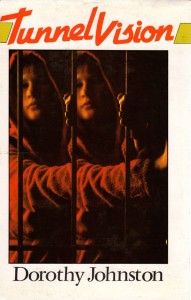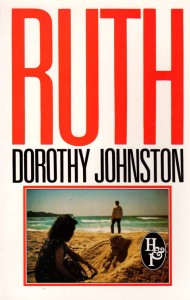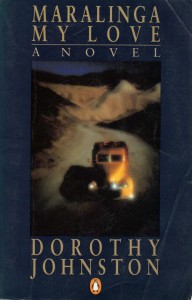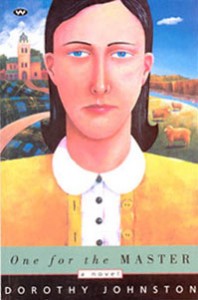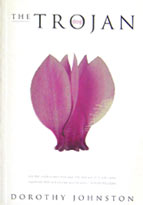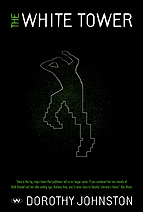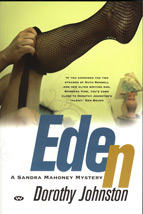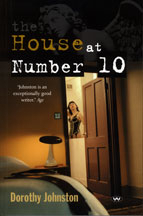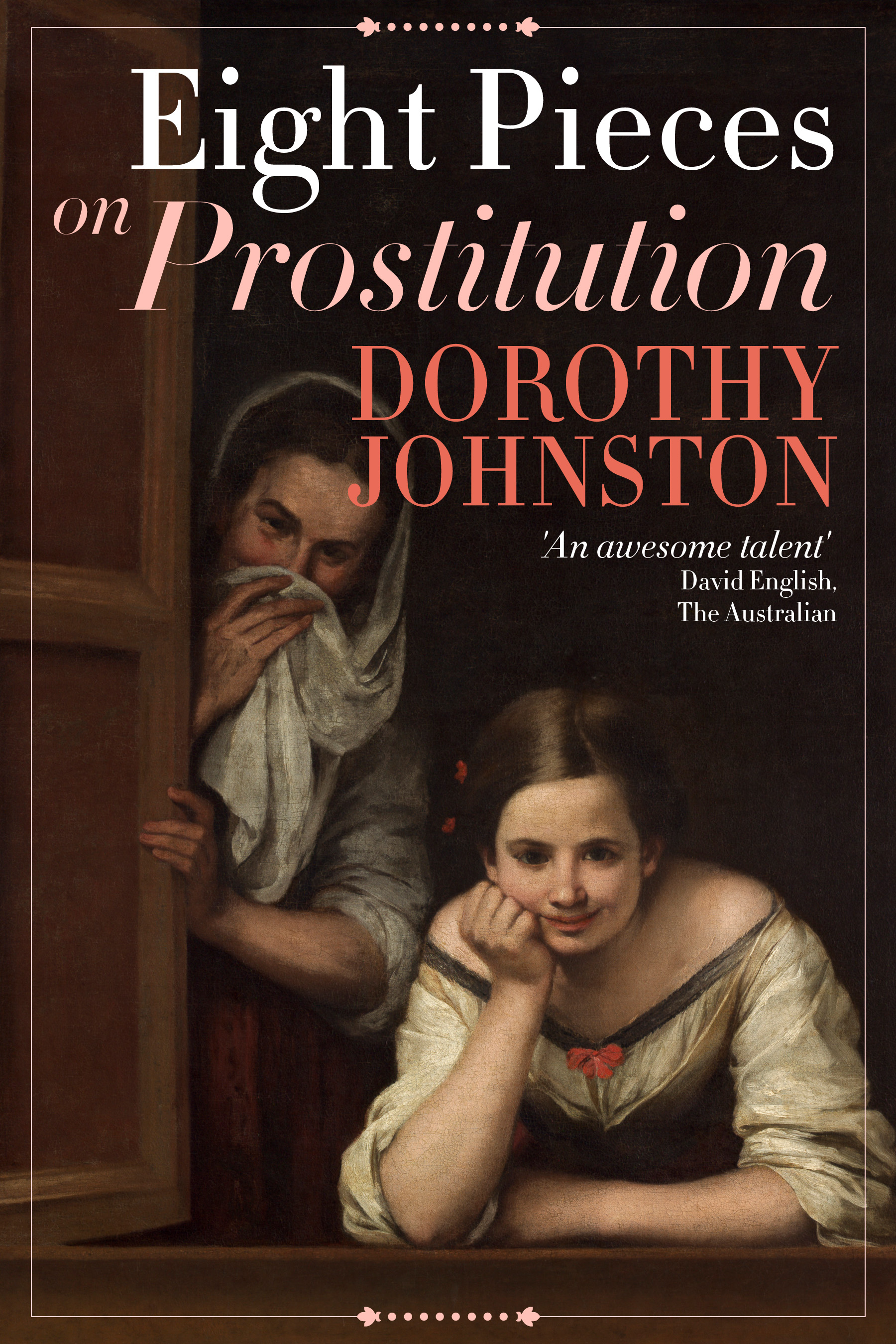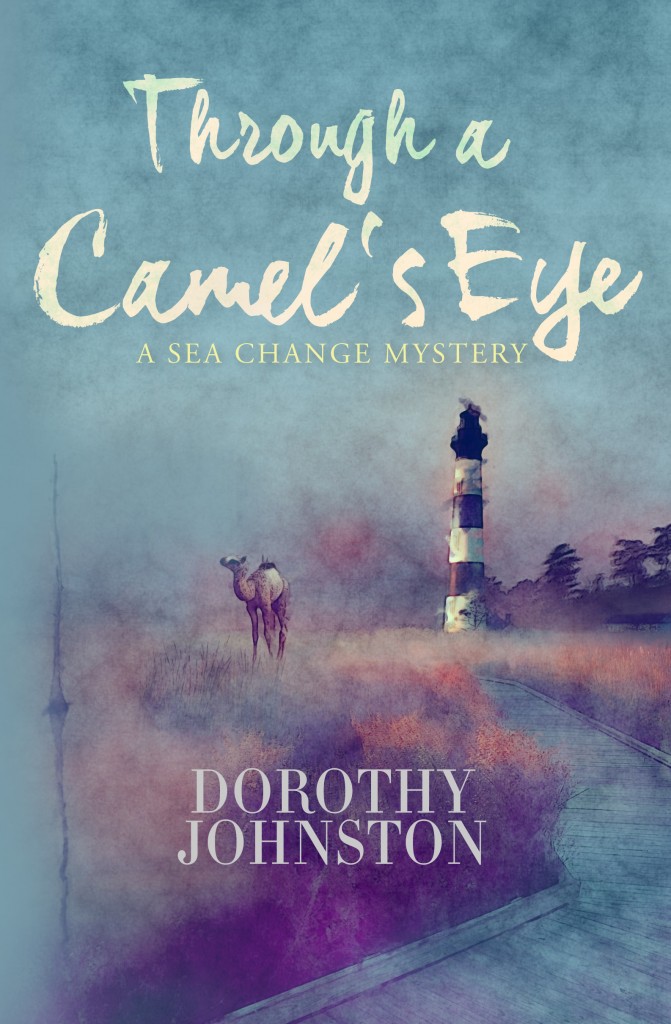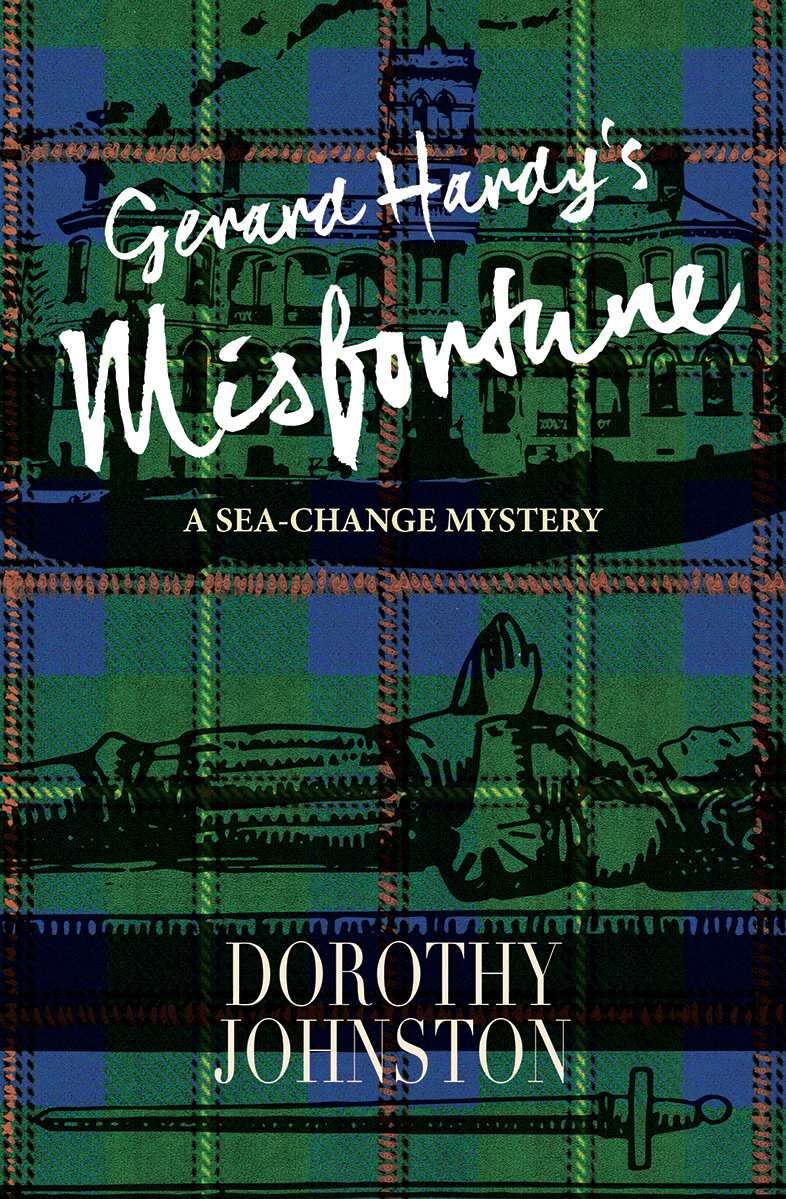‘A Script with No Words’ was first published in HEAT 1, New series, 2001
Several years ago, a group of Canberra sex-workers applied to the Australia Council and were granted $6,280 to write a film script. The organization WISE (Workers In Sex Employment) was involved. A local writer ran some workshops, characters were developed, a plot outlined. But the project caused a stir, and resulted in a good deal of bad publicity, most of which used the argument that funding prostitutes to write a film script was a waste of public money.
At the height of the fuss, the Canberra Times ran a front-page article, plus a cartoon showing a bearded man with glasses reading a script.
‘There’s a problem with the dialogue,’ the man says. A curly haired blonde woman wearing a low-cut blouse replies, ‘There isn’t any.’
‘That’s the problem,’ says the man.
Prostitution was decriminalized in the ACT in 1992. I am researching the subject because I plan to set my new book in a Canberra brothel. My first novel, Tunnel Vision, published sixteen years ago, is about a Melbourne massage parlour. Even though it’s over twenty years since I worked in a parlour myself, and that was only for about a year, since returning to the subject I’ve begun to feel absurdly possessive about it – that it belongs to me and I to it.
The idea of making a lot of money quickly, to finance writing fulltime for six, nine months, longer if I was lucky, was what took me to the Melbourne parlour. It was a selfish motive. I stayed for what was probably another selfish motive. I discovered that I knew how to behave. I knew what was expected of me. I could do it.
I finish reading the Canberra Times article and study the cartoon. It relies on the idea that the female prostitute takes part in a performance without words, that hers is a part with no lines. It assumes an intellectual and imaginative emptiness – that the prostitute’s intellect and imagination are vestigial and redundant, in much the same way as they are assumed to be for a worker on an assembly line, in a factory or mill. It reminds me how all manner of absences – verbal, psychological, emotional, the willed absence of physical sensation – can be adopted by prostitutes as survival strategies. There is the withdrawal into numbness, withdrawal of the body and the mind into an imaginary protected place.
Yet I recall, as well, how words were fundamental to what was being bought and sold. Words were rarely adequate, often comically misjudged, transparently fallacious, or wide of the mark. In the old illegal days, prostitutes and their customers developed coded dialogues of need, desire, negotiation. They were scripts capable of endless repetition, of variation on a theme. After business had been discussed, there were conversations. I never had a client who did not want to talk, and, more importantly, did not want me to talk to him, felt short-changed if I refused.
A man came to the door of the Melbourne house one afternoon. He was tallish, friendly-looking, with curly dull red hair.
I showed him into the front room and shut the door.
‘My name’s Alan,’ he said. ‘I like to start with a soft massage on the legs and back, working up to a stronger muscle massage. Then I like a little slapping on the legs and buttocks. Then I like my pubic hair pulled and a little pain around the pubic area – ’
He went on, giving a speech it was obvious he had given many times before. He spoke pleasantly and evenly. When he’d finished, I replied in the same tone, ‘I don’t do bondage. None of the girls here does bondage.’ And he left.
The most important code, which I never got to with the red-haired man, set out each of the services we did provide, together with its price. This is how I wrote about price codes in the early 1980s, for a book called So Much Hard Work, an Australian collection of writings about prostitution.
‘For $50 the client naturally gets more than for $30. But the agreement, while broadly determined by the sum of money, is still a matter of individual determination. Where I worked, a G-string massage was worth $28 and a nude $38. Both of these included hand relief, though that was never stated. A “massage complet” (French pronunciation), meant genital sex and was worth $50. The client, having paid his $28, would try to feel you up under the G-string. If you let him, you were cheating yourself of $10. The client would try to get on top of you when he’d only paid for hand relief. It was your job then to persuade him to pay for the “extras” before you went any further.’
A successful negotiation, from the prostitute’s point of view, required of the client a sense of fair play, and of herself a degree of determination and an ability to speak up. The most successful were conducted without explanations, which could be dangerous. The first-time customer asking what was meant by ‘G-string massage’ might be a policeman. So it followed that negotiations left a lot of gaps. After a price had been agreed on, two strangers found themselves alone in a room with a massage table, with nothing, and at the same time suddenly everything, to be worked out.
There is the frailty of language as a bridge, the foolhardiness of speech that both makes and breaks a spell. When I think about the speech I made, often five, six times a day, a speech beginning ‘For twenty-eight dollars you can get a G-string massage,’ I recall my fear of getting busted, that moment of silence, with any first-timer, after my speech ended, the moment which, once passed, might reveal the new customer’s identity. There is a nervous silence which words can never fill. There is the sound of the shower running, the inspection which will follow, that step forward.
I have forgotten the demands of architecture. That old house. No ensuites. Clients had to share a bathroom. It seems preposterous now. I recall waiting in one of the rooms with my client for the sound of running water to finish, the step in the corridor, creaking floorboard, till the coast was clear. They did not like passing each other in the corridor, but they shared the bathroom.
The coast clears. My client takes his turn in the shower. This hiatus, these few minutes, are the worst for me. When he returns, I will inspect his penis. ‘Complete massage,’ until then words that I could hide behind, won’t be that any longer. Though they are not supposed to, cops have been known to go through with the service and then bust the girl. They have been known to return a second, third, or fourth time and then bust the girl.
There are many stories of clients who rip their condoms off and ejaculate immediately without them. This has not happened to me yet. I fear it more than I fear getting busted.
There is the layout of a suburban house, its familiarity, then what is made of it. The familiarity is that of a certain type of Australian weatherboard, three bedrooms, verandahs front and back. When I walk up to the parlour on the first day, it reminds me of a house I lived in as a small child. The smell of the front verandah is the same, a mixture of dust, peeling paintwork, rotting upholstery.
The backyard has a rectangle of mowed lawn, a Hills Hoist, concrete paths. There is a small hallway, a straight corridor from front door to back, a bathroom in need of renovation, a kitchen.
What were designed as bedrooms are not called bedrooms because there are no beds in them. They are called ‘the rooms’, and, when distinctions are necessary, the front, second, and side room. The front room, once the house’s master bedroom, faces the street; the second, which does too, used to be the living-room. The side room overlooks a path and the house next door. Venetian blinds and curtains are always drawn. When we open at eleven in the morning, I go around opening the windows, for which I suffer, and am deaf to, daily reprimands.
The front room has an extra cupboard. Each room is lit by a low wattage lamp on a small side table, which also holds towels, tissues, talcum powder, baby oil and condoms. There is a radio which is supposed to be left on.
At the centre of each room stands the massage table, covered with a white sheet, long enough for a man of six and a half feet to stretch his legs out comfortably, but not nearly wide enough for its dual purpose. It is the right height for a massage, that is, high enough to save the masseuse from having to bend over too far and strain her back while squeezing recalcitrant thigh muscles. I much prefer using baby oil to talc, though I hate the smell of both. I am becoming quite a competent masseuse, but it is difficult to regard the tables as anything other than a joke against the kinds of masseuse we are required to be – a joke that exacts its daily quota of bruised knees.
Our backs are sore from being pressed into the wood. We have experimented with foam padding, extra towels. Our manageress has a blind spot here, as she has in other areas which concern our comfort. There are standing positions. There is the floor. By early evening, the floor begins to look like the best option. The preliminary massage is not an option. It has to be performed no matter what. The massage is a last breathing space during which a policeman might declare himself.
The radio is a background noise meant to replace the need for conversation, or the awkwardness of silence. I have many arguments with the manageress over whether or not I am allowed to turn it off. One of my first published stories, ‘The Man Who Liked To Come With The News’, is set during the 1975 constitutional crisis, when even commercial stations ran news broadcasts every ten minutes. The news is harder to shut out than music.
The kitchen sings with light. This is because the venetian blinds have been removed, curtains tied back and windows cleaned. They are left open if the day or evening is fine. No client is allowed in the kitchen.
As with other commercial transactions, there is a gap between advertisement and product, dream and commercial limitation, the ideal and its substitutes, which are acceptable, though not entirely. Consumer satisfaction always contains within it the underlying promise of consumer dissatisfaction, a reason to keep on buying. After I have been working for a few months, I begin to suspect that, from the client’s point of view, the perfect orgasm is both an unapproachable ideal, and an essential part of a business-like approach which, in some way I do not yet understand, seems tailored to correspond to mine. Customers avoid expressing general disappointment, which would mean admitting they have wasted their money, yet retain an edge of disappointment as part of their motivation for a return visit, when they will request another girl. For the girls, for us, variety is built into the system. We can hide behind the automatic nature of it, should we wish to. Should we wish to, and within limits, we can pick and choose.
There are young men whose mates have paid for them to visit a parlour. I recall one in particular, with long fine blonde hair, a surfer’s muscles. He was about to get married. I was not at all physically attracted to him. It was clear that he was not attracted to me either, but there we were. His mates were waiting in the car outside. I knew the other two girls working at the time were busy. In any case, he didn’t ask to see them. He was wound up tight by his own daring, his friends’ generosity, their expectations. I already guessed that his re-living of the experience, the post-mortem that would take place in the waiting car very shortly, would be nine-tenths invention.
He was clean, quick, efficient, for which I was, as always, grateful. What made it bearable for both of us was the easy, matter-of-fact way he talked, about himself and his engagement, his friends, what they were like, their tastes in women, giving me to understand, with a tact which was mutual, concise, that it was them he did not wish to disappoint, their imaginations he would use as a model when he made up his account of a satisfyingly voluptuous encounter in a few minutes’ time.
I recall conversations with clients as the first and only conversations there will ever be. I tell lies, and embarrass this and that one by putting on my educated voice. I am deeply bored, by them and myself. I remember strange eruptions of the ordinary, the ordinarily professional, such as the doctor, a man in his sixties, who discovered that one of my legs was shorter than the other, and proceeded to examine them, and explain the consequences for the curvature of my spine. The question did not arise: was he really a doctor? What was he really?
I think about passivity and openness, and try to fit them into a framework that might help. I read Kevin Hart in conversation with Robert Adamson in HEAT 4.
Kevin Hart says that what interests him is ‘when experience is understood as a risk, an openness which is ungrounded and insufficient to itself…an exposure of the self, a moment when you give up, when you let yourself as a personality be exposed to an anonymity that is, I would say, within yourself, at the base of the “I”.’
There is something here for me, especially the notion of exposure to anonymity. But the problem with it is that the kind of passivity the poets are discussing doesn’t correlate with sexual passivity, much less with willed absence of feeling as a survival strategy in a brothel. Yet it suddenly seems clear to me that there is a link between passivity which has an artistic aim, and the sexual passivity of the prostitute. The link is the contradiction both contain, whereby passivity, in the sense of allowing oneself to be acted on, is a necessary pre-condition, yet never more necessary than when it is about to change.
Passivity contains its own capacities, in the face of experience, art, knowledge – which comes first? – in the exposure to, the allowance of absurdity, the knowledge that hovers within and around the absurdity of selling sex. There is something about the absurd, about exposure to it, that is irreducible.
A necessary pre-condition first of all for art. Art, literature, is what I wish to put first, but the production of it I am starting to think of as primarily physical – a physical openness and waiting, which is indistinguishable from imaginative openness, which leads to the making of fiction.
There is the slide from passivity to physical cruelty. Genet understands how dramatic, plumed and brightly coloured it can be. But I don’t want to get side-tracked by Genet, and anyway when I pick up Our Lady Of The Flowers, once a favourite, I can’t get past page five.
Before and after the rooms, there are false names. There are the meanings that gather around, pay their own kind of respect to, a nom de guerre. I talk to ‘Eve’ in the kitchen. I refuse a false name and write ‘Dorothy’ in the booking diary, say my name in the rooms by way of introduction. I have this pair of soft leather shoes with a strap across the instep that I enjoy wearing. Eve calls them my Dorothy shoes. I laugh and click my heels together, but don’t fly back to Kansas.
I love the way Eve buys treats at the delicatessen for our lunches, and different kinds of teas. I am beginning to understand the importance of the kitchen.
Instead of assuming the willed absence of feeling as necessary, why not posit, as a place to start from, a bewildering multiplicity of sensations, responses, scenes and dialogues? No single one will have any more inherent survival value than another. Passivity will be one kind of capability. Anonymity will be one possible stance among a range of stances, neither more nor less theatrical than others. Will art then have to take its place alongside these others, no more privileged than the rest?
One of my clients was an aspiring artist, who used to bring along his paintings to show me. They were landscapes mostly. He’d line them up along the wall, opposite the massage table with its white sheet, under one of the windows which, as soon as the doorbell rang, I had to run around and close. When I left the parlour, he gave me as a goodbye present his painting of the Box Hill Brickworks. It was a huge, gloomy canvas, all browns and greys, and to this day the most depressing painting I have ever seen. I didn’t know what to do with it. I left it in my flat in St Kilda, behind the wardrobe, when I moved away.
I go to see one of the founding members of WISE, the organisation which received funding for the film script. She tells me a story about a parlour where she used to work, about a man who died on the job. The girls dressed him in his suit and sat him in a chair at the reception desk before calling the police. She says they did this to spare the feelings of his family, so it could be said he died while discussing the services, before availing himself of any of them. Who were they pretending for? Not the police. And not the family, although this was their stated aim. What family member could be comforted by such a lie, in such a situation? I think it most likely that they were pretending as a gesture of good-will, and for each other.
I write an opening paragraph for my new novel.
‘Eden Carmichael, Independent MLA for Monaro North, was found dead on a hot Tuesday afternoon in January. He was lying across a double bed at Canberra’s best known brothel. The bed’s covers had been pulled off and lay on the floor. He was wearing a blue and white flowered silk dress and a blonde wig.’
I think of the corset in the cupboard in the front room of the Melbourne house, how it’s shared by successive clients, how they know this and don’t seem to mind. The corset is white, a replica of the old-fashioned type with drawstrings. The cups are boned white lace. I remember opening the cupboard door and staring at the corset, how it stared back at me. When I put it away, I put it right at the back of the cupboard, underneath the towels and sheets. I think of the cover of my edition of The Female Eunuch. I wash the corset carefully in a hand basin in the laundry and hang it on the line at the back of the house.
We don’t wash the sheets and towels ourselves. That would take forever. The amenities of the house, in the laundry and kitchen, are very basic, but I like it that way. I like unpacking the freshly delivered laundry. I think about the fact that the men don’t mind sharing the corset, and whether they dress up at home, and in what. I think about how this seems part of their business-like approach.
I decide that the blonde wig in my novel, the one Carmichael is found dead in, will not belong to him, but will remain at the brothel. He will take his dress home, however, and will wash it himself between visits. The wig contains a clue to Carmichael’s death, but I don’t know yet what it will be.
I think about individuality, and how it appears and disappears through the deadpan requests of the men I service, in the ways they ask for this or that, in the detail that I keep returning to – so it must have something more to tell me – that those who fancied a bit of female underwear didn’t mind sharing the corset – in the practicality of a client I can suddenly remember very clearly, who never stayed longer than twenty minutes, who visited in his lunch-hour every second Friday, who could never take his shoes off because when he got excited his feet swelled up and he couldn’t get them back on again. After he’d ejaculated, he lay flat on the massage table without saying anything, and his feet looked enormous.
In the evenings, I play the piano and read a book on the Knossos labyrinth. I cannot read fiction. This has never happened to me before, though it has happened to several of my friends. I practice a Schubert impromptu with five flats. It is too hard for me. I have only recently started playing the piano again. I long for that understanding of the fingers, once part of a despised discipline. Occasionally I can feel it coming back. Nothing matters except that the notes should sound together as they are meant to.
In the 1970s, St Kilda was becoming gentrified. I was living in a flat in Eildon Road. The brick fence at the front of the flats was warm to the touch when I came home after a day’s work. I would sometimes stop and chat to the street workers. Once I had a long talk to a woman, while both of us sat on the brick fence, but talking for any length of time was unusual. Something else was unusual too, a meeting at the St Kilda Town Hall that took place towards the end of 1978.
A residents group called ‘Westaction’ was campaigning vigorously to get rid of street prostitution. Their tactics included throwing stones and buckets of water. Property values were one worry, but some Westaction members had a comprehensive view of how the suburb should be changed. One woman told me, ‘I don’t believe we should have the theatres, the artistic or entertainment element, where we have children to bring up.’
The title of the meeting was ‘The St Kilda Public Forum on Residential Amenity’. A letter of invitation lists the speakers as a Westaction representative, the Commissioner of Police, a St Kilda Council representative, and a State Government representative. Eight hundred people turned up to the Town Hall. In my chapter for So Much Hard Work, I described it as a rowdy meeting.
‘Tempers were high. A small group of women calling themselves the ‘Prostitutes’ Action Group’ appeared. Despite a lot of protests, they were allowed a speaker at the last minute. I was there with them.
I think our unexpected presence – people realised suddenly that Westaction wasn’t going to have things all its own way – was probably the cause of many people losing their tempers.’
What I remember best is fear for the street workers who got up and said St Kilda was their suburb too.
Our clients received the answer ‘no’ to most questions which began, ‘Do you do?’ or, ‘Have you got?’ We were plain and simple, offering only basic services. We did not do bondage, work with dogs or whips. We did not wear black suspender belts, or dress up as school-girls. We had no theme rooms with silk wall hangings, or spa baths in the Roman style. The word bordello comes to mind by way of contrast with our small shabby house, a house that was replicated, with minor differences, all over Melbourne.
It is Ed Carmichael who continues to take me back there, now I have imagined him. I do not know much about Carmichael’s past. At night, when I am tired, it depresses me that the Melbourne parlour will not yield the facts I need, will not tell me how or why he died; though it has told me that he takes his flowered dress home to wash. I see him standing at the bathroom basin in his flat. He does not use the building’s communal laundry.
In spite of all those times doing up the corset, pulling it tight, I know almost nothing about men dressing up in women’s clothes. Carmichael crosses and re-crosses borders largely mysterious to me, yet I have no doubt at all that he must travel in this way, or that he dies on one of his habitual crossings.
In the dim light from the lamp in the front room, the cheap white lace of the corset stands out, at one with the white sheet covering the massage table. It stands out also against the client’s black and grey chest hair, shiny from the shower. I pass my fingers over the lace. No matter how many times it’s washed, it never feels soft. I smell damp hair, talcum powder, anxiety. I do not look down and neither does he. He has put on our bit of female underwear (the only one on offer) as a last resort, after other inducements have been tried, and failed.
Impotence is stubborn. The client knows he has not sought, or arrived at, the right place for a cure, yet there is something stubborn in him that goes on hoping for, expecting it. He lies down and I take hold of him with my fingers of a competent masseuse, though we both know it will not be any good. Though he has paid to fuck me, he will not. Today will be like the other days. He will leave and I will hope, fervently, that he will not return.
There is something stubborn in me too, and young and arrogant, that refuses to participate in a failure of this kind. I barely speak. I refuse to dress up myself, in any costume, let alone this one; but it is a blanket refusal, it applies to all my customers. I push with both hands against the kind of complicity that would have me play the role of therapist.
What bothers me about the notion of play, in the way it’s often talked about, is the assumption that all forms of play are benign, that anyone can learn how to perform with anyone else, and with words, but more importantly, can get away with doing so.
At the same time, there is this other thing – the mood of sexual readiness. There is no code for it, no true words, perhaps not even slighting or embarrassed ones. The doorbell rings and what are we – Pavlov’s dogs? It seems that yes we are, but in spite of everything it seems also that there’s a stubbornness, an energy for renewal in this too.
It is the one taboo, our physical arousal, the existence or extent of it. Should I assume that Eve and the other girls have never felt, or have overcome it? We joke about the size of clients’ dicks. We talk a lot about getting busted, and how to avoid it. Our manageress boasts that her regular payments to the police ensure we won’t be. Regular payments have been known to fail. Cops can be recognized by the look in their eye, blue eyes of a certain tint, moustaches of a certain jaunty angle. If you suspect one, keep him talking till he gives himself away. You can’t be busted for talking about the price of a complete massage.
We keep the money in the stove. The police, were they to raid us, would find it within thirty seconds. We don’t pretend it’s safe there, but somehow, when we discuss alternatives, none seems more attractive. I like opening the oven door and looking at the money.
We tell combat stories. I tell the story of the shoes and swollen feet, aware of a small prickle of betrayal, because I like the swollen-foot man. He’s a regular and no trouble.
Physical arousal is fugitive and unexpected, inside the rooms as elsewhere. Yet for the time I spend working in that house, I trust that I will eventually find the code for it, or no longer need one. It is the case that words reveal nothing of the mood of waiting for the doorbell. Waiting belongs to raised hair along the forearms, to nose and eyes and skin. Words can be retained for their uselessness, as well as for any other reason.
Something else occurs to me. If I’ve been thinking of conversation as a bridge between strangers who catapult themselves into sex paid for by the half-hour, then the plainer I make their conversations, the better it will be. I will make my characters speak very plainly to one another. Their inferences and allusions will be couched in the simplest words, as though this itself, if tested, tried, tested once again, might become a form of trust. Carmichael, with his politician’s education, will not be an exception.
I think about practising the piano when the house is quiet. At dusk, I take the dogs for a walk. Later on, I write this bit of the novel.
‘A cloud rolled its huge golden underbelly over Lyneham oval. The green beneath it was the trees’ hosed summer exuberance, shading into grey as colour dissolved, an expectant darkness waiting for the large one.
Gold grew, spreading through the cloud. It touched the spears of poplars that lined Sullivan’s Creek, vertical to its high horizontal. This last light was massy, indiscriminate and yet precise. I thought of the divisions within and through my city, on highways, roads, cracks in Civic footpaths that were familiar, nondescript, repeated as often as the scene in front of me was repeated, glowing and then gone.
To play is always to risk ridicule and censure, even the games that others ask for, even sex – to play is to risk running too fast, not fast enough, stumbling, tripping over your big feet, tripping another – oops, and sorry not enough. To play is to let the wind under your skirt at the wrong moment, that skittish wind that follows sunset and leaves before true dark. Or your trousers, held together by a piece of string. Or your blue dress, gorgeous in the last light, and the yellow soft enhancement of your wig.’
